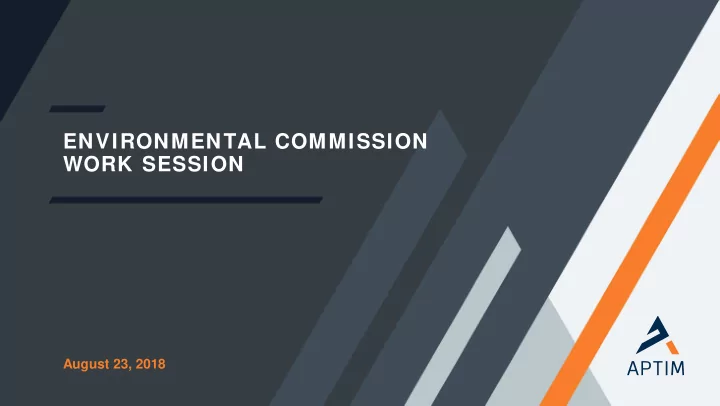

ENVIRONMENTAL COMMISSION WORK SESSION August 23, 2018
PROJECT BACKGROUND Future information to be delivered to Environmental Commission: • Cost of service analysis • Peer community benchmarking - Costs - Programs & performance • Scientific public survey results • Draft and final options and recommendations 2
STAKEHOLDER INTERVIEWS Completed July & August 2018 (except as noted) 18 separate interview groups: • A2Y Chamber • Recycle Ann Arbor • Advanced Disposal • University of Michigan • City of Ann Arbor (Alley Work Group, • Washtenaw Area Apartment Assoc. Customer Service, Operations, • Washtenaw County Planning, Sustainability) • Waste Management • Downtown Development Authority • Zingerman's (DDA) • Ann Arbor Public Schools (upcoming) • Ecology Center • WeCare / Denali (upcoming) • Midwestern Consulting, LLC 3
GUIDING INTERVIEW QUESTIONS 1. Tell us about your organization and how you interact with the City of Ann Arbor on solid waste-related issues - including trash, recycling, organic waste (for example, food waste), fats/oils/grease (FOG), and downtown alleys. 2. What are the strengths that you see in Ann Arbor’s current programs and services? What are the areas that could use improvement? 3. What topic areas, programs, services, or policies do you think should be addressed through the Solid Waste Resources Management Plan? How would those items impact your business and/or your interaction with the City? How would they impact your perception / others’ perception of the City? 4. What are your three primary priorities related to solid waste resource management (for example, protect public health, environmental-consciousness, cost- effectiveness, convenience, sustainability, quality service, waste reduction, simplicity, aesthetics/cleanliness, alley improvements, business growth, etc.)? 5. Do you believe there are opportunities for your organization to take a role in advancing solid waste resource management in the City? If so, what role may you have? What resources are available to you currently, or what resources would you require? 4
SUMMARY STAKEHOLDER INTERVIEW FINDINGS 1. Ann Arbor set the pace in environmental leadership with recycling, composting, and its Zero Waste vision – build on those successes! 2. Sustain the vision by expanding services – including year-round and business composting, weekend collection service downtown, expanded program to support student move-outs, etc. 3. Modernize and staff operations to meet needs – including route optimization software, new trucks, consolidated and enhanced customer service, centralization of responsibility/accountability, enforcement of requirements, etc. 4. Educate, educate, educate – the City used to provide it, bring it back in force. 5
STAKEHOLDER PERCEPTIONS / FEEDBACK 6
PERCEIVED STRENGTHS 7
PERCEIVED OPPORTUNITIES 8
PERCEIVED WEAKNESSES 9
PERCEIVED NEEDS 10
COMMISSION INPUT - GUIDING QUESTIONS 1. What are your three primary priorities related to solid waste resource management (for example, protect public health, environmental-consciousness, cost-effectiveness, convenience, sustainability, quality service, waste reduction, simplicity, aesthetics/cleanliness, alley improvements, business growth, etc.)? 2. What are the strengths that you see in Ann Arbor’s current programs and services? What are the areas that could use improvement ? 3. Based on your knowledge of solid waste resource management, and considering the Stakeholder Perceptions/Feedback contained in the interview summary (provided in the pre-meeting package), what topic areas, programs, services, or policies do you think should be addressed through the Solid Waste Resources Management Plan? 4. How do you perceive future opportunities and conditions (e.g., regionalization, recycling market volatility) may impact decisions about the programs that may be pursued by the City during the planning period? 11
Recommend
More recommend